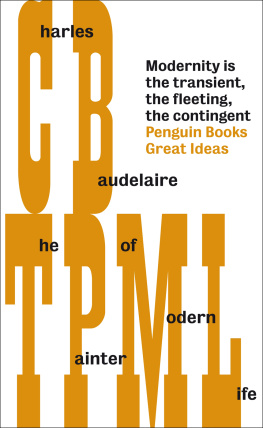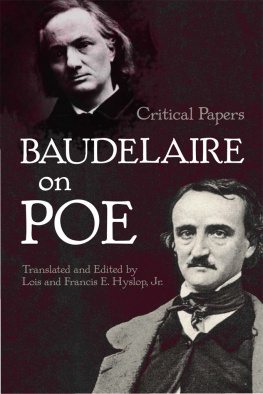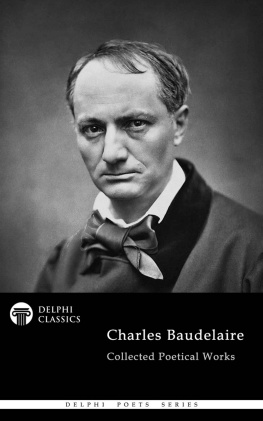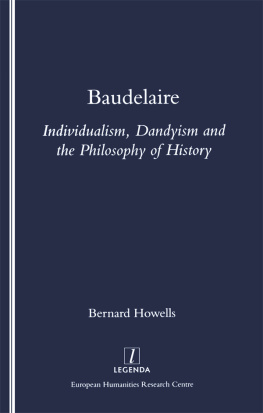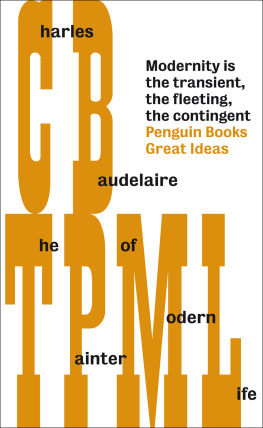Charles-Pierre Baudelaire - The Painter of Modern Life
Here you can read online Charles-Pierre Baudelaire - The Painter of Modern Life full text of the book (entire story) in english for free. Download pdf and epub, get meaning, cover and reviews about this ebook. year: 2010, publisher: Penguin Classics, genre: Science. Description of the work, (preface) as well as reviews are available. Best literature library LitArk.com created for fans of good reading and offers a wide selection of genres:
Romance novel
Science fiction
Adventure
Detective
Science
History
Home and family
Prose
Art
Politics
Computer
Non-fiction
Religion
Business
Children
Humor
Choose a favorite category and find really read worthwhile books. Enjoy immersion in the world of imagination, feel the emotions of the characters or learn something new for yourself, make an fascinating discovery.
- Book:The Painter of Modern Life
- Author:
- Publisher:Penguin Classics
- Genre:
- Year:2010
- Rating:4 / 5
- Favourites:Add to favourites
- Your mark:
- 80
- 1
- 2
- 3
- 4
- 5
The Painter of Modern Life: summary, description and annotation
We offer to read an annotation, description, summary or preface (depends on what the author of the book "The Painter of Modern Life" wrote himself). If you haven't found the necessary information about the book — write in the comments, we will try to find it.
The Painter of Modern Life — read online for free the complete book (whole text) full work
Below is the text of the book, divided by pages. System saving the place of the last page read, allows you to conveniently read the book "The Painter of Modern Life" online for free, without having to search again every time where you left off. Put a bookmark, and you can go to the page where you finished reading at any time.
Font size:
Interval:
Bookmark:
Charles Baudelaire
182167
- Seneca On the Shortness of Life
- Marcus Aurelius Meditations
- St Augustine Confessions of a Sinner
- Thomas Kempis The Inner Life
- Niccol Machiavelli The Prince
- Michel de Montaigne On Friendship
- Jonathan Swift A Tale of a Tub
- Jean-Jacques Rousseau The Social Contract
- Edward Gibbon The Christians and the Fall of Rome
- Thomas Paine Common Sense
- Mary Wollstonecraft A Vindication of the Rights of Woman
- William Hazlitt On the Pleasure of Hating
- Karl Marx & Friedrich Engels The Communist Manifesto
- Arthur Schopenhauer On the Suffering of the World
- John Ruskin On Art and Life
- Charles Darwin On Natural Selection
- Friedrich Nietzsche Why I am So Wise
- Virginia Woolf A Room of Ones Own
- Sigmund Freud Civilization and Its Discontents
- George Orwell Why I Write
- Confucius The First Ten Books
- Sun-tzu The Art of War
- Plato The Symposium
- Lucretius Sensation and Sex
- Cicero An Attack on an Enemy of Freedom
- The Revelation of St John the Divine and The Book of Job
- Marco Polo Travels in the Land of Kubilai Khan
- Christine de Pizan The City of Ladies
- Baldesar Castiglione How to Achieve True Greatness
- Francis Bacon Of Empire
- Thomas Hobbes Of Man
- Sir Thomas Browne Urne-Burial
- Voltaire Miracles and Idolatry
- David Hume On Suicide
- Carl von Clausewitz On the Nature of War
- Sren Kierkegaard Fear and Trembling
- Henry David Thoreau Where I Lived, and What I Lived For
- Thorstein Veblen Conspicuous Consumption
- Albert Camus The Myth of Sisyphus
- Hannah Arendt Eichmann and the Holocaust
- Plutarch In Consolation to his Wife
- Robert Burton Some Anatomies of Melancholy
- Blaise Pascal Human Happiness
- Adam Smith The Invisible Hand
- Edmund Burke The Evils of Revolution
- Ralph Waldo Emerson Nature
- Sren Kierkegaard The Sickness unto Death
- John Ruskin The Lamp of Memory
- Friedrich Nietzsche Man Alone with Himself
- Leo Tolstoy A Confession
- William Morris Useful Work v. Useless Toil
- Frederick Jackson Turner The Significance of the Frontier in American History
- Marcel Proust Days of Reading
- Leon Trotsky An Appeal to the Toiling, Oppressed and Exhausted Peoples of Europe
- Sigmund Freud The Future of an Illusion
- Walter Benjamin The Work of Art in the Age of Mechanical Reproduction
- George Orwell Books v. Cigarettes
- Albert Camus The Fastidious Assassins
- Frantz Fanon Concerning Violence
- Michel Foucault The Spectacle of the Scaffold
- Lao Tzu Tao Te Ching
- Writings from the Zen Masters
- Thomas More Utopia
- Michel de Montaigne On Solitude
- William Shakespeare On Power
- John Locke Of the Abuse of Words
- Samuel Johnson Consolation in the Face of Death
- Immanuel Kant An Answer to the Question: What is Enlightenment?
- Joseph de Maistre The Executioner
- Thomas De Quincey Confessions of an English Opium Eater
- Arthur Schopenhauer The Horrors and Absurdities of Religion
- Abraham Lincoln The Gettysburg Address
- Karl Marx Revolution and War
- Fyodor Dostoyevsky The Grand Inquisitor
- William James On a Certain Blindness in Human Beings
- Robert Louis Stevenson An Apology for Idlers
- W. E. B. Du Bois Of the Dawn of Freedom
- Virginia Woolf Thoughts on Peace in an Air Raid
- George Orwell Decline of the English Murder
- John Berger Why Look at Animals?
- Chuang Tzu The Tao of Nature
- Epictetus Of Human Freedom
- Niccol Machiavelli On Conspiracies
- Ren Descartes Meditations
- Giacomo Leopardi Dialogue Between Fashion and Death
- John Stuart Mill On Liberty
- Charles Darwin Hosts of Living Forms
- Charles Dickens Night Walks
- Charles Mackay Some Extraordinary Popular Delusions
- Jacob Burckhardt The State as a Work of Art
- George Eliot Silly Novels by Lady Novelists
- Charles Baudelaire The Painter of Modern Life
- Sigmund Freud The Wolfman
- Theodor Herzl The Jewish State
- Rabindranath Tagore Nationalism
- Vladimir Ilyich Lenin Imperialism
- Winston Churchill We Will All Go Down Fighting to the End
- Jorge Luis Borges The Perpetual Race of Achilles and the Tortoise
- George Orwell Some Thoughts on the Common Toad
- Chinua Achebe An Image of Africa
It is recorded that when Madame Dubarry wanted to avoid receiving the King, she was careful to put on rouge. That was enough; it meant she was closing her door. In beautifying herself she used to put to flight the royal disciple of nature.
In all social circles, and even in art circles, there are people who go to the Louvre, walk quickly past a large number of most interesting though secondary pictures, without throwing them so much as a look, and plant themselves, as though in a trance, in front of a Titian or a Raphael, one of those which the engravers art has particularly popularized; then they go out satisfied, as often as not saying to themselves: I know my gallery thoroughly. There are also people who, having once read Bossuet and Racine, think they have got the history of literature at their fingertips.
Happily from time to time knights errant step into the lists critics, art collectors, lovers of the arts, curious-minded idlers who assert that neither Raphael nor Racine has every secret, that minor poets have something to be said for them, substantial and delightful things to their credit, and finally that, however much we may like general beauty, which is expressed by the classical poets and artists, we nonetheless make a mistake to neglect particular beauty, the beauty of circumstance, the description of manners.
I am bound to admit that, for several years now, society has shown some improvement. The value that todays collectors attach to the delightful engraved and coloured trifles of the last century shows that a reaction has begun in the direction needed by the public; Debucourt, the Saint-Aubins and many others have achieved mention in the dictionary of artists worthy of study. But these represent the past, whereas my purpose at this moment is to discuss the painting of our contemporary social scene. The past is interesting, not only because of the beauty that the artists for whom it was the present were able to extract from it, but also as past, for its historical value. The same applies to the present. The pleasure we derive from the representation of the present is due, not only to the beauty it can be clothed in, but also to its essential quality of being the present.
I have here in front of me a series of fashion plates, the earliest dating from the Revolution, the most recent from the Consulate or thereabouts. These costumes, which many thoughtless people, the sort of people who are grave without true gravity, find highly amusing, have a double kind of charm, artistic and historical. They are very often beautiful and wittily drawn, but what to me is at least as important, and what I am glad to find in all or nearly all of them, is the moral attitude and the aesthetic value of the time. The idea of beauty that man creates for himself affects his whole attire, ruffles or stiffens his coat, gives curves or straight lines to his gestures and even, in process of time, subtly penetrates the very features of his face. Man comes in the end to look like his ideal image of himself. These engravings can be translated into beauty or ugliness: in ugliness they become caricatures; in beauty, antique statues.
Font size:
Interval:
Bookmark:
Similar books «The Painter of Modern Life»
Look at similar books to The Painter of Modern Life. We have selected literature similar in name and meaning in the hope of providing readers with more options to find new, interesting, not yet read works.
Discussion, reviews of the book The Painter of Modern Life and just readers' own opinions. Leave your comments, write what you think about the work, its meaning or the main characters. Specify what exactly you liked and what you didn't like, and why you think so.

